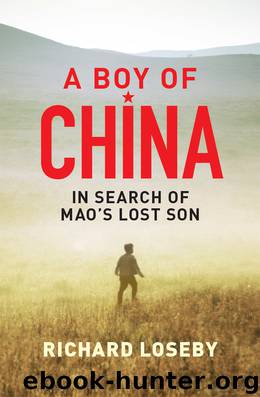A Boy of China by Richard Loseby

Author:Richard Loseby
Language: eng
Format: epub
Publisher: HarperCollins Publishers
Published: 2016-04-09T04:00:00+00:00
Chinese tourists stare in awe at the Luding Bridge
The entrance to old man Hsu’s house, Luding
With that, he barked out some more commands and in due course the goat was led from where it had obviously taken up residence and was then shackled to the iron ring on the well, where it remained for the rest of the day, forlornly chewing on the husks of a dried corn cob.
The old man’s name was Hsu Teh-Huai. He was 72½ — a good age, he noted, smiling — and had been a teacher all his life, even through the Cultural Revolution, when the Communists had persecuted teachers and sent many, including him, onto the land to work. He had never given up his classes though. He simply moved them from the schoolroom to the outdoors, where he taught physics and chemistry amongst fields of barley and rice. Eventually the Communists let him go back to the school in order to lecture on Party-approved subjects — he didn’t say what, but judging from the smirk on his face he must have ignored those orders and continued with his own syllabus.
‘Do you like science?’ he enquired.
‘Yes,’ I replied.
He nodded, then tapped at the ground with his cane. ‘It is real and solid, like this stone. You can stand on it, build on it. The Communists would have me teach lies instead, and you can’t build anything of substance on those.’
Under Mao in the 1960s, anyone who didn’t rebel alongside the Red Army was labelled a ‘rightist’ and such people were often sent away for re-education, or simply shot. As with many revolutions, it was the young intelligentsia, fresh from their universities in the big cities who became the most ardent supporters, calling themselves the ‘Red Guards’ and spouting forth slogans and political rhetoric that it was risky to ignore, and downright dangerous to disobey. They were organised, their numbers were in the millions and growing by the day, and in some cases they were armed with more than just righteousness. They were a militant mob, hellbent on ridding their world of any perceived threat to their leader, Mao Tse-tung. Often those who were singled out for punishment were prominent writers, artists, scholars and other professionals such as doctors and teachers.
I asked Hsu if he had suffered during this period, and he held out the little finger of his left hand. Most of it was missing, chopped off, he said, by a young man who accused Hsu of being privileged and ‘bourgeois’.
‘I don’t think he knew the meaning of the word,’ he said, somewhat bitterly.
I looked at Hsu’s clothes and saw the careful needlework repairs that kept sleeve attached to shoulder and pocket connected to breast. There was nothing ‘bourgeois’ about him at all. Far from it: judging from the roughness of his hands, he had clearly been no stranger to hard work through the years.
‘Of course,’ he added a few moments later, absent-mindedly rubbing the stump of his little finger, ‘I had to give up playing the organ.
Download
This site does not store any files on its server. We only index and link to content provided by other sites. Please contact the content providers to delete copyright contents if any and email us, we'll remove relevant links or contents immediately.
Asking the Right Questions: A Guide to Critical Thinking by M. Neil Browne & Stuart M. Keeley(5765)
Autoboyography by Christina Lauren(5228)
Eat That Frog! by Brian Tracy(4527)
Dialogue by Robert McKee(4390)
Sticky Fingers by Joe Hagan(4190)
Journeys Out of the Body by Robert Monroe(3621)
Annapurna by Maurice Herzog(3464)
Full Circle by Michael Palin(3443)
Schaum's Quick Guide to Writing Great Short Stories by Margaret Lucke(3376)
Elements of Style 2017 by Richard De A'Morelli(3343)
The Art of Dramatic Writing: Its Basis in the Creative Interpretation of Human Motives by Egri Lajos(3063)
Atlas Obscura by Joshua Foer(2955)
Why I Write by George Orwell(2945)
The Fight by Norman Mailer(2930)
The Diviners by Libba Bray(2928)
In Patagonia by Bruce Chatwin(2922)
The Mental Game of Writing: How to Overcome Obstacles, Stay Creative and Productive, and Free Your Mind for Success by James Scott Bell(2904)
Venice by Jan Morris(2570)
The Elements of Style by William Strunk and E. B. White(2470)
